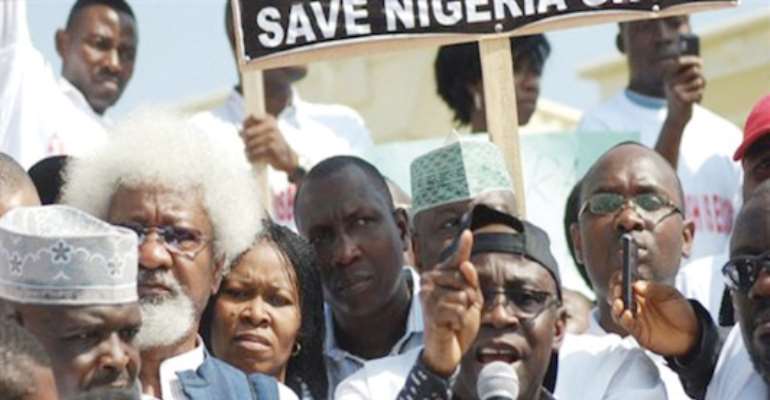Blame FG For Murder Of Journalists - Bakare

LAGOS, Nov 10, (THEWILL) - Convener of the Save Nigeria Group (SNG) and General Overseer of the Latter Rain Assembly, Pastor Tunde Bakare today said the federal government should be held responsible for the incessant killing of Nigerian journalists.
Bakare blamed the federal government for the killing of media professionals due to what he described as its failings in providing an enabling environment for journalists to work, saying it is a bad trend that could undermine the exercise of the freedom of speech.
The pastor said this at the 30th anniversary of Lagos Television station held in Ikeja, Lagos, where he spoke as Guest Speaker.
Speaking on the topic: ‘The Role of the Media in Nation-Building’, Bakare lamented over the increasing number of media professionals, who have been murdered in the last two decades without any breakthrough in police investigations.
The renowned preacher addressed a gathering of such political leaders as the first civilian governor of Lagos State, Alhaji Lateef Jakande, the incumbent Governor Babatunde Raji Fashola (SAN), Deputy Governor Sarah Sosan, former state Military Administrator, Admiral Mike Akhigbe and Commissioner for Information & Strategy, Comrade Opeyemi Bamidele.
He cited the murder of former Editor-in-Chief of Newswatch Magazine, Mr. Dele Giwa whom he said, was gruesomely killed courtesy of a ‘parcel bomb’ with a seal of a former military Head of State who came to power in the mid 1980s.
Bakare said: “Mr. Dele Giwa opened a parcel with the seal of the president which was followed by an explosion that ultimately claimed his life. In spite of the vociferous battle by the late Chief Fawehinmi, the culprits are still out of the reach of the law. Mr. Dele Giwa has since been joined by Mr. Chinedu Obaro, Mr. Bagauda Kaltho, Mr. Tunde Oladipo, Mr. Bayo Ohu, Mr. Godwin Agboroko and Mr. Edo Ugbagwu among others.” He said the Nigerian media “operates in a hostile political and economic environment. The political environment is not friendly because power is exercised by those who have no conscience and see public offices as a means of solving their financial quest. They (the political office-holders) have created a culture of fear where media practitioners have to look over their shoulders and tread cautiously.
“Harsh economic environment has also made the media vulnerable because the cost of staying in the market is considerably high and poverty rate has reduced their purchasing power. To survive in this harsh environment, a lot of media houses have to live on patronage. The integrity of journalism is compromised in the process. The net effect of this is enormous,” he said.
The preacher however saluted the courage of the Nigerian media “in the struggle for democracy. Despite the vibrancy of the country’s media, its anti-colonial struggles, war against military dictatorship and genuine democratic freedom, the political leaders were hell-bent on silencing the media in order to foist its evil agenda on the citizenry.”
He asked the media to build on the heroic sacrifices that have been made over the years in spite of the choking environment, noting that without democracy, there cannot be liberty, ‘since democracy and freedom are inextricably interwoven.’
At the anniversary, Governor Raji Fashola (SAN) urged the Nigerian journalists to improve its investigative, research and analytical capacities in order to report key issues in the country.
Fashola said developing such capacities “is the only way to separate facts from fictions. The media are critical to the fight against poverty. We will indeed keep this fight aglow irrespective of what it entails to do so.”
He commended the former Lagos State Governor Lateef Kayode Jakande for his vision in setting up Lagos Television three decades ago and all his successors for making conscious efforts to build on what Jakande started.
He therefore said there “is nothing wrong in continuing the policies of previous administrations. This is because building on what the previous administration has done is not all about personality, but strictly about the people.”
